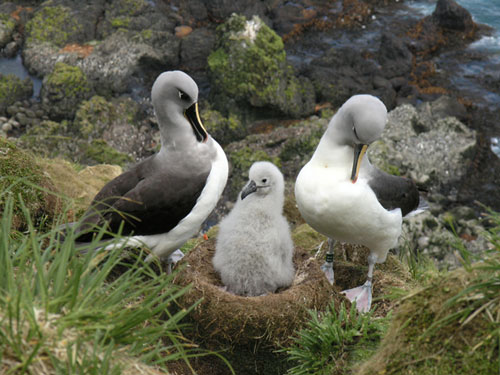Project summary:
The project will compare patterns of movements and habitat use within and between different species breeding at South Georgia [Islas Georgias del Sur]*, and explore the implications for life-histories. Analyses will explore: effects of age, sex and other intrinsic characteristics; individual consistency; links between foraging and individual life-history data or species strategies (timing of key breeding events and variability, critical stages/resource bottle-necks, provisioning, breeding performance and frequency, survival); reproductive constraints vs. seasonality in the environment (given the differences in distribution with breeding stage and year); intra- and inter-specific competition; and, potentially, prediction of long-term effects of environmental change based on IPCC climate change scenarios.
Importance of the area of research:
Albatross and petrel communities in the Southern Ocean are highly species-rich, and include many long-ranging taxa competing for patchy and unpredictable prey. They often rely to some extent on Antarctic krill, but foraging strategies differ and the diet always includes other prey species which may not be in common. Co-existence is enabled by variety of mechanisms – differences in timing of breeding, spatial distribution, diet and other aspects of behaviour – which reduce competition for resources among and within-species, and lead to niche partitioning. Foraging decisions of individual birds reflect the interaction between these and other environmental factors, and intrinsic effects (sex, age, physiological status, carry-over effects etc.). By exploring the links between movements, habitat use and life-history characteristics at the individual and species-level, this project will provide key insights into the structure and maintenance of marine predator communities in Antarctic and subantarctic ecosystems.

A Grey-headed Albatross family, photograph by Rowan Treblico
Contact the Lead Supervisor, Richard Phillips, British Antarctic Survey directly for further information relating to what the successful applicant will be expected to do, training to be provided, and any specific educational background requirements.
Read more here.
References:
Froy, H., Lewis, S., Catry, P., Bishop, C.M., Forster, I.P., Fukuda, A., Higuchi, H., Phalan, B., Xavier, J.C., Nussey, D.H. & Phillips, R.A. 2015. Age-related variation in foraging behaviour in the wandering albatross at South Georgia: no evidence for senescence. PLoS ONE 10 e0116415.
Wakefield, E.D, Phillips, R.A., Trathan, P.N., Arata, J., Gales, R., Huin, N., Robertson, G., Waugh, S.M., Weimerskirch, H. and Matthiopoulos, J. 2011. Habitat preference, accessibility and competition limit the global distribution of breeding black-browed albatrosses. Ecological Monographs 81: 141-167.
Phillips, R.A, Silk, J.R.D., Phalan, B., Catry, P. & Croxall, J.P 2004. Seasonal sexual segregation in two Thalassarche albatross species: competitive exclusion, reproductive role specialization or trophic niche divergence? Proceedings of the Royal Society Series B271: 1283-1291.
To find out about applying for this project click here.
John Cooper, ACAP Information Officer, 11 November 2015
*A dispute exists between the Governments of Argentina and the United Kingdom of Great Britain and Northern Ireland concerning sovereignty over the Falkland Islands (Islas Malvinas), South Georgia and the South Sandwich Islands (Islas Georgias del Sur y Islas Sandwich del Sur) and the surrounding maritime areas.

 English
English  Français
Français  Español
Español